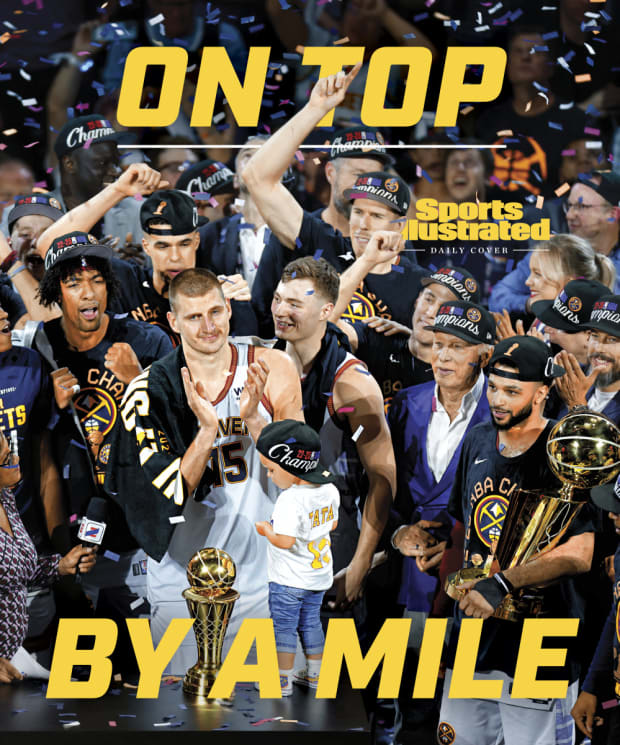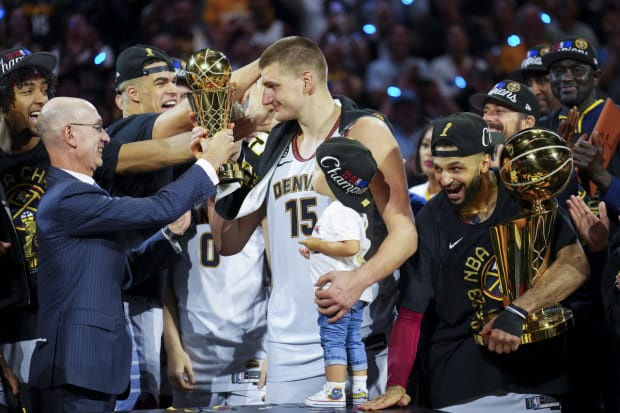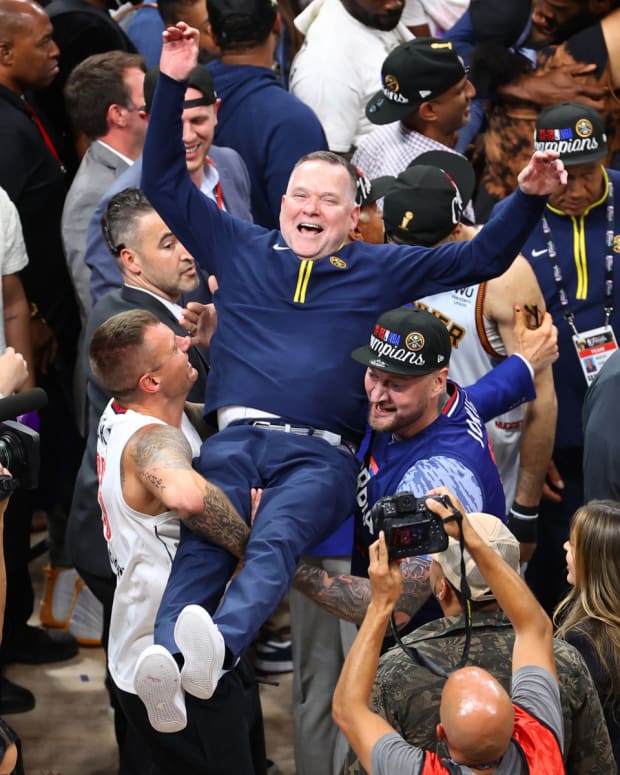As the final buzzer sounded Monday, as blue-and-gold confetti rained down from the rafters and 19,537 title-starved fans roared, Nikola Jokić walked dutifully toward the Heat sideline. There were handshakes for Bam Adebayo, for Jimmy Butler, for Kevin Love. There were hugs for Kyle Lowry, Caleb Martin and Cody Zeller.
When he finished, Jokić stood near the scorer’s table, expressionless. He softly clapped his hands together, celebrating—if that’s what you want to call it—as only Jokić can.
He then spotted his brother Nemanja, one of the few who truly understood his journey to this moment. A decade earlier, Nikola Jokić was in Serbia, a frumpy teenager who was barely registering on NBA scouts’ radars. A second-round pick—when Jokić was drafted, ESPN was airing a Taco Bell commercial—who molded his body to meet the challenges of NBA basketball and polished his game to a level where he could dominate it. Now, after five All-Star appearances, two league MVP awards and NBA Finals MVP honors, Jokić has not only established himself as one of the best players of this generation, but he has also earned a spot among the all-time greats.

Justin Edmonds/Getty Images
“I think it’s a great journey, 41st pick [in the draft], but that doesn’t matter,” Jokić said. “When you’re here, you’re a player.”
Across the court, Jamal Murray crouched, his head buried in his jersey. It has been a little more than two years since he tumbled to the floor in San Francisco, his ACL snapped, his season over, his future in doubt. The next day, Murray boarded the team bus, tears welling in his eyes. ACL tears are not the career-threatening injuries they used to be, but at that moment, Murray felt like damaged goods.
As the bus rolled toward the airport, Murray asked Denver coach Michael Malone if the team was going to trade him. “Hell no,” Malone said. “You’re ours.” On Monday, when Murray got to his feet, Malone was among the first to embrace him.
“It was a lot,” Murray said. “I couldn’t hold it in. It was just something I’ve been working for my whole life. I think Mike [Porter Jr.] said it. Every real hooper wants to be on this stage and play in the game and be in this moment. To see it full circle, going from my rehab, not being able to walk, go up the stairs. Not just for a month or two. It was for a long time. A lot of different things are going through my head. A lot of tears. A lot of blood, sweat and tears, and real ones.”
In the middle of Monday’s celebration was Porter. For years, he wondered whether a string of back surgeries—three in all—would derail his career. He battled through them this season, playing a career-high 62 games and emerging as an offensive force in the playoffs. In the Finals, though, his shot abandoned him. After Game 3, Malone was asked whether he planned to replace him. He refused, insisting Porter would bounce back. In Game 5, Porter scored 16 points and collected 13 rebounds, with his lone three-pointer coming in the third quarter, a 25-footer that gave Denver its first second-half lead.
“I’m not even supposed to be here, to be honest with you,” Porter said. “After everything I’ve been through, I’m not really supposed to be a world champion. But to do it with this group of dudes after everything.” His voice trailed off. “I can’t describe it. I look back on everything, how hard I worked, and it just feels surreal.”
The final score of Monday’s Game 5: Denver 94, Miami 89. And this was anything but easy. Foul trouble plagued the Nuggets in the first quarter. Turnovers got to them in the second. A Butler surge in the fourth quarter nearly sent this series back to South Florida. But Denver battled. Murray made shots. Jokić made plays. And on a cool night in Colorado, a 47-year championship drought ended.
“Sometimes a dream is deferred; and our dream was deferred for a few years,” Malone said. “But we stuck with it and we added the right pieces. Huge shout-out to [general manager] Calvin Booth and the job he’s done. This is just an unbelievable feeling.”

Jesse D. Garrabrant/NBAE/Getty Images
Malone can trace his belief in the Jokić-Murray pairing to the day: April 11, 2018, Game 82 of the Nuggets’ season, a gut-wrenching overtime loss against Minnesota that eliminated Denver from the playoffs.
In a disappointed locker room, Malone found hope. In Jokić, the Nuggets had found an emerging center. In Murray, a dynamic guard. Team president Josh Kroenke offered a handshake and told Malone he was excited about the team’s future.
“That was really early on,” Malone said. “I’m just thankful that we as an organization have been given the time that is required to get to this stage. Most places, that does not happen.”
Of all the reasons Denver is here—Jokić’s brilliance, Murray’s development, Aaron Gordon’s ability to seamlessly transition to a different role—organizational patience, perhaps, is at the top of the list. In many ways, the Nuggets are a super team but one developed, not bought. Denver didn’t make the playoffs in any of Malone’s first three seasons. They made one conference finals in the next four.
Teams have been broken up for less.
Coaches have been fired for far less.
Ownership, led by Stan Kroenke, believed in him. “I’ve never felt any pressure,” Malone said. They let Malone coach. They allowed Tim Connelly, the team’s former GM, to draft and deal. They were patient with Jokić, who showed flashes of brilliance early. Malone recalls a game early in Jokić’s rookie season when Jokić submitted a near 20-point triple-double against Tim Duncan.

Jack Dempsey/AP
“That was, for me, kind of when that light bulb went off,” Malone said. “I was saying, ‘Wow, what he just did, who he did it against, on the road against this team coached by that guy, this kid has a chance to be a special player.’”
Duncan. It’s a name Malone connects often to Jokić. “I look at Nikola in the same vein,” Malone said. The skills. The selflessness. The commitment to basketball … and not much else.
“He’s not trying to be something he’s not,” Malone said. “He’s not trying to create a narrative other than ‘I’m Nikola Jokić, I play for the Denver Nuggets, I’m going to do everything I can to help our team win. I’m going to do it with class, professionalism. I’m never going to make it about me.’ That’s a rarity.
“He’s a truly selfless superstar, where it’s not about him. He’s not looking for people to say, ‘Look at me; tell me how great I am.’ He’s almost embarrassed by the attention. He wants to be one of the guys in the locker room, have fun, work hard and win.”
And the Nuggets have built around him.
They ended the Jokić–Jusuf Nurkić partnership after fewer than two seasons. They drafted Murray. They traded for Gordon. They built chemistry. They established trust. “Just down the line, everybody had a role to play in our success,” Murray said. When Connelly left to become president of basketball operations for Minnesota, Booth took over. He acquired Kentavious Caldwell-Pope, a defensive-minded wing. He signed Bruce Brown. He gave an offensive-oriented team some defensive muscle. He made them complete.
“I came here when I was 20,” Jokić said. “If you want to be a success, you need a couple of years. You need to be bad, then you need to be good, then when you’re good, you need to fail, and then when you fail, you’re going to figure it out. I think experience is something that is not what happened to you. It’s what you’re going to do with what happened to you. … There [are] steps that you need to fill and there [are] no shortcuts. It’s a journey, and I’m glad that I’m part of the journey.”

Jesse D. Garrabrant/NBAE/Getty Images
Settling into his seat at the postgame press conference, a sweat-soaked championship T-shirt clinging to him, Malone offered an anecdote.
“Pat Riley said something many years ago,” Malone said. “I used to have it up on my board when I was a head coach in Sacramento, and it talked about the evolution in this game and how you go from a nobody to an upstart, and you go from an upstart to a winner, and a winner to a contender and a contender to a champion. And the last step after is a champion is to be a dynasty.”
A dynasty. The Nuggets have the pieces.
Jokić is 28. The trio supporting him—Gordon, Murray and Porter—are younger. Denver’s core is under contract through at least 2025. The Nuggets will likely lose Brown this offseason, with Brown far outplaying the max salary ($7.7 million) Denver can pay him, but Christian Braun looks ready for a bigger role next season. Peyton Watson has shown potential. Barring injury, the Nuggets will begin next season as betting favorites.
And they should be. Denver went 16–4 in the playoffs. No opponent pushed the Nuggets further than six games. They have the NBA’s best player, one of its best guards and a collection of talent comfortable in their roles.
“It’s long before we made it here that I thought this was going to happen,” Murray said. “I had a belief of being in the playoffs before, having the experience, seeing the team and the chemistry grow, having the same core my whole career, that’s when I saw it. That’s when I believed it.”
Dynasties, for better or worse, have defined the NBA for decades, with San Antonio, Miami and Golden State forming some of the more recent ones. In Denver, the Nuggets believe they have one. Accepting the championship trophy, Malone declared, “We want more.”
Later, as Malone sipped from a champagne-sized Michelob Ultra bottle, he insisted this wasn’t the end of Denver’s journey but a stop along the way.
“We’re not satisfied,” Malone said. “We accomplished something this franchise has never done before, but we have a lot of young talented players in that locker room, and I think we just showed through 16 playoff wins what we’re capable of on the biggest stage in the world.”







